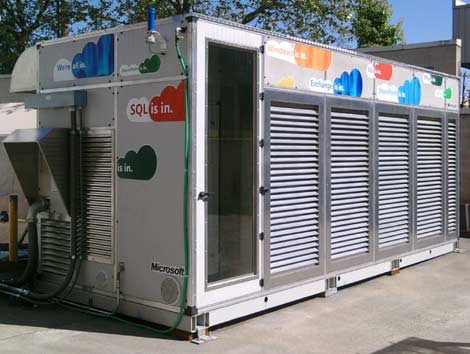
Will the Microsoft IT-PAC container soon be making appearances in North Carolina?
Is Microsoft focusing on North Carolina in its search for major data center in the Mid-Atlantic region? Back in February we reported that Microsoft was scouting site locations for a data center in either Virginia or North Carolina. In May the speculation focused on sites in Virginia. But this week the action seems focused on North Carolina, where the state legislature is preparing a new round of data center tax incentives, and Microsoft is reportedly considering a site in Alamance County.
The Burlington Times News recently reported that Microsoft may be the mystery company involved in "Project Deacon," a large data center project that could bring at least $120 million in fresh investment to the North Carolina Industrial Center in Mebane, N.C. The park is operated by Samet Corp., which was marketing the property last month at the spring conference for the 7x24 Exchange, an industry group for data center professionals.
New Incentives in the Works
Meanwhile, the North Carolina state Senate has passed an updated package of incentives (S-1711) that would beef up the state's incentives for data centers. The measure is awaiting action in the state assembly (H-1958).
The bill, known as the "Keeping North Carolina Competitive Act," is targeted to attract two major data center projects - the Microsoft requirement and a data center for Fidelity Investments, according to the Triangle Business Journal.
The incentives bill expands on earlier measures passed to attract major data center projects for Google and Apple. The North Carolina law allows data centers to pay a one percent "privilege tax" on data center equipment, rather than the usual seven percent sales tax.
The new bill would broaden the eligibility of data centers, and also appears to extend the one percent privilege tax to all electricity used by an Internet data center, which is normally subject to a state sales and use tax of 3 percent. Since power is a major component of data center costs, that could be an attractive incentive should the measure pass.
New Container Design
Microsoft is said to be seeking sites for a new data center featuring the company’s latest container-based design. The container, known as an IT PAC (short for “pre-assembled component”) is designed to operate in all environments, and employ a free cooling approach in which fresh air is drawn into the enclosure through louvers in the side of the container. The container effectively functions as a huge air handler with racks of servers inside.
This next-generation design allows Microsoft to forego the concrete bunker exterior seen in many data centers in favor of a steel and aluminum structure built around a central power spine. Most importantly, Microsoft says the new design could slash its data center construction costs by 50 percent or more.
When a large company looks for a site for a major data center, it’s almost always a multi-state process. Issues like power costs, the suitability of a site for using free cooling and the availability of recycled water have been major site location factors in recent data center decisions.
Dueling Incentives
But nowadays, the decision often boils down to economic incentives. Last year Virginia adopted targeted tax incentives to attract major data center projects to the state, offering an exemption from the Virginia Retail Sales and Use tax for computer equipment bought or leased between July 1, 2010 and June 30, 2020 for use in a data center.
To qualify for the tax break, the facility must be located in Virginia, generate capital investment of at least $150 million and create at least 50 new jobs that pay 1.5 times the prevailing average wage in the locality.




